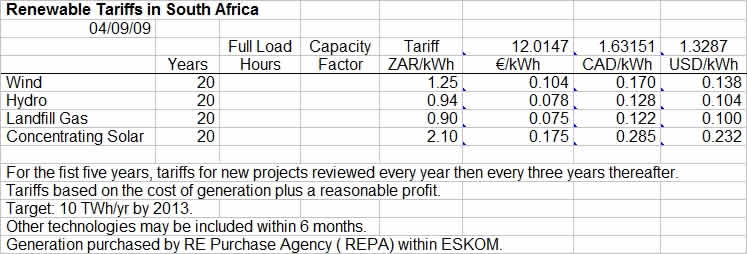South Africa's National Energy Regulator (NERSA) announced March 31, 2009 the introduction of a system of feed-in tariffs designed to produce 10 TWh of electricity per year by 2013.
The feed-in tariffs announced were substantially higher than those in NERSA's original proposal. The tariffs, differentiated by technology, will be paid for a period of 20 years.
NERSA said in its release that the tariffs were based, as in most European countries, on the cost of generation plus a resonable profit.
The tariffs for wind energy and concentrating solar power are among the most attractive worldwide.
The tariff for wind energy, 1.25 ZAR/kWh (€0.104/kWh, $0.14 USD/kWh, $0.17 CAD/kWh) is greater than that offered in Germany (€0.092/kWh) and more than that proposed in Ontario, Canada ($0.135 CAD/kWh).
The tariff for concentrating solar, 2.10 ZAR/kWh (€0.175/kWh), is less than that in Spain (€0.278/kWh), but offers great promise in the bright sunlight of South Africa.

NERSA's revised program followed extensive public consultation.
Dr. Ruth Rabinowitz, a member of the South African parliament for the Inkatha Freedom Party said that NERSA's tariffs reduce the need for the legislature to act on feed-in tariffs. Rabinowitz was the author of a private members bill 9n 2008 to introduce a system of feed-in tariffs in South Africa. However, she said there is still a need for comprehensive legislation that includes municipalities in developing renewable energy.
Stefan Gsänger, Secretary General of the World Wind Energy Association said in a release that "South Africa is the first African country to introduce a feed-in tariff for wind energy. Many small and big investors will now be able to contribute to the take-off of the wind industry in the country. Such decentralised investment will enable South Africa to overcome its current energy crisis. It will also help many South African communities to invest in wind farms and generate electricity, new jobs and new income. We are especially pleased as this decision comes shortly after the first North American feed-in law has been proposed by the Government of the Canadian Province of Ontario."
NERSA Decison on Renewable Energy Feed-in Tariffs



